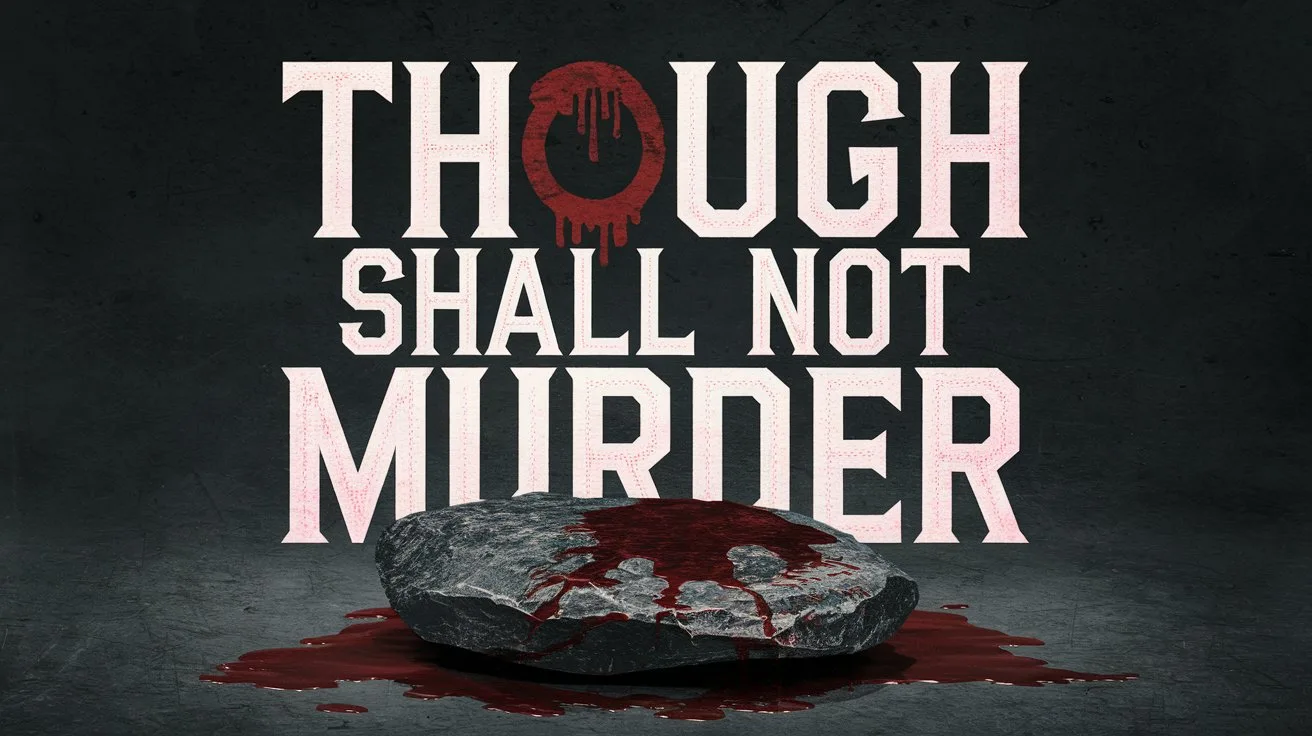The commandment “Thou shall not murder” is one of the Ten Commandments given to Moses by God, recorded in Exodus 20:13. Many people misunderstand this commandment, assuming that it forbids all forms of killing. However, the Bible makes a clear distinction between murder, which is the unjust taking of innocent life, and killing that is either justifiable or divinely commanded.
Understanding this distinction requires looking at the original Hebrew word רָצַח (ratsach), which refers specifically to intentional, unlawful killing rather than acts of war, self-defense, or executions carried out under God’s law. Throughout Scripture, we see examples where God commands the Israelites to carry out justice, engage in battle against wicked nations, or administer capital punishment (actions that do not fall under the category of murder).
This study will explore what the Bible defines as murder, the instances where God permits or commands killing, the situations where killing is considered justified, and the spiritual implications of this commandment in light of Jesus’ teaching. By examining these truths, we can better understand God’s justice, the sanctity of human life, and the condition of the human heart.
What is Murder According to the Bible?
Murder is the intentional, unjustified killing of an innocent person. It is an act of hatred, selfishness, or injustice, and the Bible strongly condemns it.
Examples of Murder in the Bible
Cain murdering Abel – The first recorded murder was when Cain, in jealousy, killed his brother Abel.
“Now Cain talked with Abel his brother; and it came to pass, when they were in the field, that Cain rose up against Abel his brother and killed him.” (Genesis 4:8)David having Uriah killed – David had Uriah, Bathsheba’s husband, placed in battle to be killed because he had sinned with Bathsheba.
“Set Uriah in the forefront of the hottest battle, and retreat from him, that he may be struck down and die.” (2 Samuel 11:15)Jezebel and Ahab murdering Naboth – King Ahab desired Naboth’s vineyard, and his wife Jezebel arranged for Naboth to be falsely accused and executed.
“They carried him out of the city and stoned him with stones, so that he died.” (1 Kings 21:13)
These examples highlight that murder is always condemned in Scripture as an act of wickedness.
When Did God Command Killing?
While murder is forbidden, there are instances where God commanded killing in the Bible. These examples fall into three main categories:
Capital Punishment (Justice for Murder and Wickedness)
God established capital punishment for certain crimes.
“Whoever sheds man’s blood, by man his blood shall be shed; for in the image of God He made man.” (Genesis 9:6)
“He who strikes a man so that he dies shall surely be put to death.” (Exodus 21:12)
Murderers were to be put to death as a just punishment. This was not considered murder but divine justice.
War and Warfare Against Wicked Nations
There were times when God commanded Israel to destroy wicked nations.
The conquest of Canaan: God commanded Israel to wipe out the Canaanites because of their extreme wickedness, including child sacrifice and idolatry.
“You shall utterly destroy them: you shall make no covenant with them nor show mercy to them.” (Deuteronomy 7:2)Saul’s command to destroy Amalek: God ordered Saul to destroy the Amalekites for their sins against Israel.
“Now go and attack Amalek, and utterly destroy all that they have, and do not spare them.” (1 Samuel 15:3)
These killings were not acts of personal vengeance but were executed as divine judgment against nations that had been given centuries to repent but persisted in evil.
Self-Defense and Protection of the Innocent
Scripture allows killing in self-defense.
“If a thief is found breaking in, and he is struck so that he dies, there shall be no guilt for his bloodshed.” (Exodus 22:2)
When a person’s life is at immediate risk, taking the life of the attacker is not considered murder. The intent is to protect, not to kill unjustly.
When is Killing Considered Murder?
While some killings are justified in justice, war, and self-defense, the Bible clearly condemns certain forms of killing as murder.
Premeditated Murder
If someone intentionally kills another person out of hatred or selfishness, it is murder.
“But if a man acts with premeditation against his neighbor, to kill him by treachery, you shall take him from My altar, that he may die.” (Exodus 21:14)
Killing the Innocent
God hates the shedding of innocent blood.
“These six things the Lord hates… hands that shed innocent blood.” (Proverbs 6:16-17)
Abortion, unjust war, and killing out of greed or malice fall into this category.
Hatred in the Heart is Murder in God’s Eyes
Jesus expanded the definition of murder to include hatred and anger in the heart.
“You have heard that it was said to those of old, ‘You shall not murder, and whoever murders will be in danger of the judgment.’ But I say to you that whoever is angry with his brother without a cause shall be in danger of the judgment.” (Matthew 5:21-22)
This shows that murder is not just an outward act but also a heart condition.
The Spiritual Implication: How This Commandment Points to Christ
The sixth commandment, “You shall not murder,” is about more than just physical killing—it points to the sanctity of life and our need for redemption. Jesus took the punishment for our sin, including murder.
“But God demons/”>demonstrates His own love toward us, in that while we were still sinners, Christ died for us.” (Romans 5:8)
Even murderers can be forgiven if they repent and trust in Jesus. Paul himself had approved of killings before his conversion (Acts 8:1), yet God transformed him into a great apostle. God’s law reveals our sin, and only Christ can cleanse our hearts. If hatred is murder in God’s eyes, then every person needs the saving grace of Jesus Christ.
My Final Thoughts
The commandment “Thou shall not murder” is a call to respect life as God’s creation. While not all killing is murder, unjust killing is always condemned in Scripture. God allows justice, war against extreme evil, and self-defense, but He forbids hatred, revenge, and shedding innocent blood.
This commandment also goes deeper: it exposes the sinfulness of the human heart. Jesus taught that anger and hatred are just as serious as murder in God’s eyes. This is why only through Jesus Christ can we be truly changed and learn to love as God loves.
May we honor God’s holiness, uphold the value of life, and seek to love rather than hate, walking in righteousness through the power of the Holy Spirit.





 Get the book that teaches you how to evangelize and disarm doctrines from every single major cult group today.
Get the book that teaches you how to evangelize and disarm doctrines from every single major cult group today.